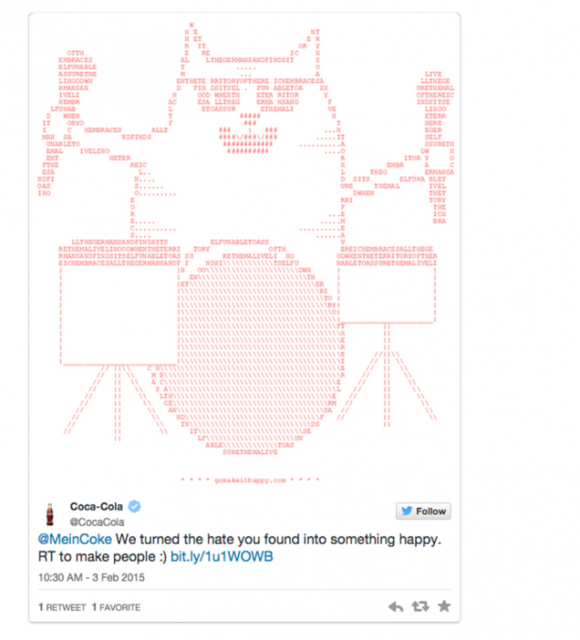MeinCoke: Coca-Cola’s Automated Twitter Campaign Proves to Be A Struggle.
Coca-Cola has been forced to suspend their recent twitter advertising campaign entitled #MakeItHappy after a prank by Gawker.com tricked the soda company into inadvertently re-tweeting large portions of Adolf Hitler’s infamous autobiographical manifesto Mein Kampf.
The campaign was launched during the Super Bowl last Sunday and according to Coco-Cola its aim was to “tackle the pervasive negativity polluting social media feeds and comment threads across the internet”. The campaign encouraged Twitter users to mark any hateful or offensive tweets with the #MakeItHappy hashtag and the brand would then use an encoding system called ASCII to rearrange the letters of the tweet to form cute images of cartoon lettuce and dancing chicken drumsticks and other benign works of art.

Each transformation was accompanied by a tweet from Coca-Cola exclaiming; “We turned the hate you found into something happy.”
However, the people over at Gawker.com weren’t fully comfortable with Coca-Cola’s efforts to curb hateful speech – particularly after they noticed a tweet from Coke’s Twitter account that had turned the “Fourteen Words” slogan of white nationalism into a loveable balloon dog.
Gawker’s editor, Max Read, was quick to criticise the campaign, writing that “Even when the text is shaped like a dog, it is disconcerting to see Coca-Cola, the soda company, urge its social media followers to safeguard the existence and reproduction of white racists.” According to Read and his co-workers, the campaign was flawed because it didn’t offer a means of preventing trolling and offensive tweeting, but rather it repeated hateful speech and in doing so increased the potential for such writing to be seen.
To illustrate this flaw the team at Gawker created a Twitter bot called MeinCoke and tweeted lines from Mein Kampf at Coca-Cola to see if the brand would then rework the infamous text into ASCII art. Needless to say, that’s exactly what they did and when they began to receive a flurry of complaints they quickly shut the campaign down.
A spokeswoman from Coca-Cola has since released the following statement: “The #MakeItHappy message is simple: The Internet is what we make it, and we hoped to inspire people to make it a more positive place. It’s unfortunate that Gawker is trying to turn this campaign into something that it isn’t. Building a bot that attempts to spread hate through #MakeItHappy is a perfect example of the pervasive online negativity Coca-Cola wanted to address with this campaign.”
Whether Gawker should be hounded for corporate trolling or congratulated for highlighting a genuine flaw in the Coca-Cola’s campaign is a matter of personal opinion. Either way, it was an unfortunate end to a campaign that was at its core intended to be positive.